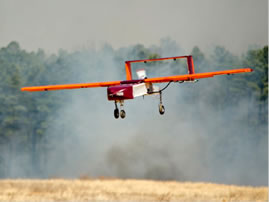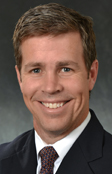The newest practice group at one of Richmond’s biggest law firms has its eye on the sky.

A SPAARO aircraft designed and built by Virginia Tech flying at our Kentland Farms facility near Blacksburg, Virginia.
LeClairRyan recently launched a group that specializes in legal issues involving Unmanned Aircraft Systems (UAS) – more commonly known as drones.
The practice has about 20 lawyers — including two in Richmond — who specialize in aviation, intellectual property, litigation and other areas. Tim Adelman, an attorney and certified flight instructor, leads the group from LeClairRyan’s Annapolis, Md., office.
Adelman said he’s been working with clients with UAS legal concerns – both in the public and private sectors — since 2006.
“Privacy has become a hot button issue with unmanned aircraft,” he said.
Niche practice groups are common for law firms seeking to capitalize on emerging industries and issues. Two lawyers at Thompson McMullan, for example, launched a practice in 2012 to focus on the growing brewery industry in the state. Other firms have recently formed groups to focus on the Consumer Financial Protection Bureau and the Affordable Care Act.
Questions about drones and their use in the business world came up late last year when Amazon revealed its hopes to use them to deliver packages in the not-so-distant future.
But Adelman said the concept is too complicated for current technology. And there’s a lot to be worked out with FAA regulations.
“The FAA defines them as aircraft,” he explained. That definition applies even if the drone is only sent up 100 feet from the ground.
Adelman said drones aren’t being used much in the Richmond area. But three hours west, Virginia Tech is part of a group that was selected by the FAA as one of six test sites to research how to integrate drones into the national airspace.
Jon Greene, interim executive director of the Mid-Atlantic Aviation Partnership, leads the group at Virginia Tech.
“We’re right on the cutting edge of a new business,” he said. “The challenge of integrating unmanned aircraft into the airspace in a responsible manner – it’s a very interesting task.”
Greene said he hadn’t heard of any law firms getting involved in UAS issues, although he’s been contacted by some insurance companies with interest.
“There are some interesting liability issues. If an unmanned aircraft has an accident, who is liable for it?” Greene said. “Privacy is something that had a whole lot of attention last year. How do we make sure these things are operated responsibly?”
Greene said he foresees that drones will be used in coming years to support agriculture, emergency response, and agriculture.
Greene said Virginia Commonwealth University and the University of Virginia, along with NASA, have also used drones in Virginia for research.
Greene said Virginia Tech is looking for uninhabited areas to test drones. Some testing has already been done on a farm
near the university, in Canada and at Fort Pickett.
“There’s a lot of things we’ve got to figure out before we start flying these things around,” he said.
Unmanned Aircraft Systems don’t come cheap. Adelman said a simple system might cost a couple thousand dollars while a more complex one could run anywhere from $100,000 to more than a million.
LeClairRyan was founded in Richmond and has 63 attorneys here, the company said. It has two Richmond offices, one on East Franklin Street and another in Riverfront Plaza on East Byrd Street. The firm has about 350 attorneys in offices across the country.
The firm has been in growth mode over the past few years, tacking on teams of attorneys and entire firms.
On Jan. 1, it added 10 attorneys to its Newark office from a nearby firm.
In October 2013, it absorbed Annapolis-based Adelman, Sheff & Smith.
The newest practice group at one of Richmond’s biggest law firms has its eye on the sky.

A SPAARO aircraft designed and built by Virginia Tech flying at our Kentland Farms facility near Blacksburg, Virginia.
LeClairRyan recently launched a group that specializes in legal issues involving Unmanned Aircraft Systems (UAS) – more commonly known as drones.
The practice has about 20 lawyers — including two in Richmond — who specialize in aviation, intellectual property, litigation and other areas. Tim Adelman, an attorney and certified flight instructor, leads the group from LeClairRyan’s Annapolis, Md., office.
Adelman said he’s been working with clients with UAS legal concerns – both in the public and private sectors — since 2006.
“Privacy has become a hot button issue with unmanned aircraft,” he said.
Niche practice groups are common for law firms seeking to capitalize on emerging industries and issues. Two lawyers at Thompson McMullan, for example, launched a practice in 2012 to focus on the growing brewery industry in the state. Other firms have recently formed groups to focus on the Consumer Financial Protection Bureau and the Affordable Care Act.
Questions about drones and their use in the business world came up late last year when Amazon revealed its hopes to use them to deliver packages in the not-so-distant future.
But Adelman said the concept is too complicated for current technology. And there’s a lot to be worked out with FAA regulations.
“The FAA defines them as aircraft,” he explained. That definition applies even if the drone is only sent up 100 feet from the ground.
Adelman said drones aren’t being used much in the Richmond area. But three hours west, Virginia Tech is part of a group that was selected by the FAA as one of six test sites to research how to integrate drones into the national airspace.
Jon Greene, interim executive director of the Mid-Atlantic Aviation Partnership, leads the group at Virginia Tech.
“We’re right on the cutting edge of a new business,” he said. “The challenge of integrating unmanned aircraft into the airspace in a responsible manner – it’s a very interesting task.”
Greene said he hadn’t heard of any law firms getting involved in UAS issues, although he’s been contacted by some insurance companies with interest.
“There are some interesting liability issues. If an unmanned aircraft has an accident, who is liable for it?” Greene said. “Privacy is something that had a whole lot of attention last year. How do we make sure these things are operated responsibly?”
Greene said he foresees that drones will be used in coming years to support agriculture, emergency response, and agriculture.
Greene said Virginia Commonwealth University and the University of Virginia, along with NASA, have also used drones in Virginia for research.
Greene said Virginia Tech is looking for uninhabited areas to test drones. Some testing has already been done on a farm
near the university, in Canada and at Fort Pickett.
“There’s a lot of things we’ve got to figure out before we start flying these things around,” he said.
Unmanned Aircraft Systems don’t come cheap. Adelman said a simple system might cost a couple thousand dollars while a more complex one could run anywhere from $100,000 to more than a million.
LeClairRyan was founded in Richmond and has 63 attorneys here, the company said. It has two Richmond offices, one on East Franklin Street and another in Riverfront Plaza on East Byrd Street. The firm has about 350 attorneys in offices across the country.
The firm has been in growth mode over the past few years, tacking on teams of attorneys and entire firms.
On Jan. 1, it added 10 attorneys to its Newark office from a nearby firm.
In October 2013, it absorbed Annapolis-based Adelman, Sheff & Smith.


At least three offices. One more (energy group) on 4201 Dominion Park Boulevard, Suite 200, in Innsbrook (Glen Allen). While not technically the city of Richmond, I’d think most would consider it “in Richmond.”